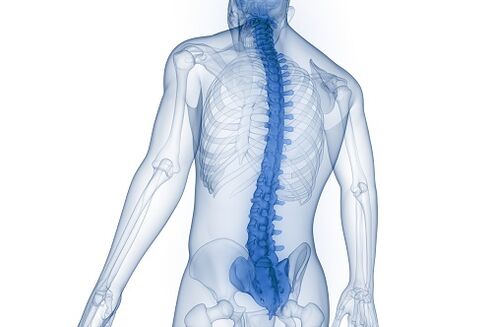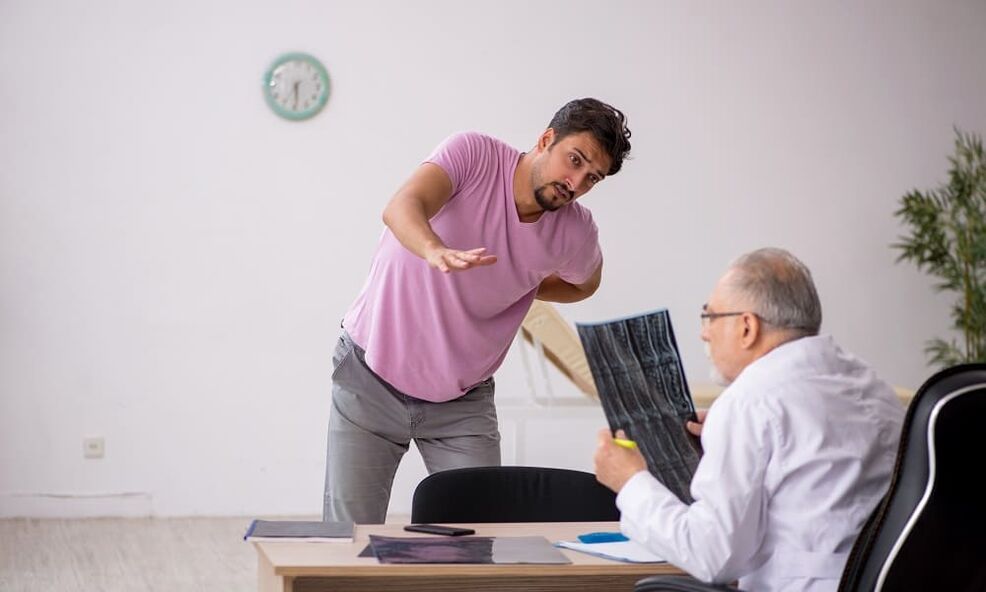
Discomfort in this area is familiar to almost everyone. People encounter it at a young age, and by the age of 30-40, lower back pain becomes commonplace.
However, only a specialist can determine why the lower back may hurt so much that it is impossible to straighten, even lying down hurts, and pain shoots in the lower back after every movement.
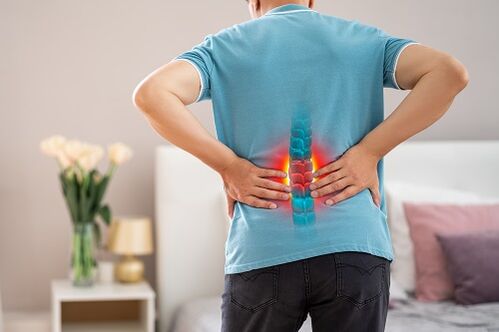
Causes
People want to find out why and why the lower back hurts so much when you sit or stand, with any movement the spine behind the back gives off pain, so that it cannot straighten up after sitting on a chair, and what to do with these symptoms, how and what to treat, which caused her to feel unwell. It is impossible to answer these questions unambiguously and without thorough research, because there can be a lot of root causes.
Spinal diseases
When a person complains "I can’t sit and it hurts to walk, " the lower back hurts when standing up or sitting on a chair, often cannot walk or stand for a long time, it is impossible to relax in a sitting position for a month, the cause of this is diseases of the spine.
Moreover, pathologies can be either congenital or acquired due to an incorrect lifestyle, predisposition or injury.
Common causes of pain in spinal diseases:
- Congenital anomalies.
- Poor blood circulation in the spinal cord.
- Degenerative changes.
- Secondary nerve damage that develops against the background of changes in the position of the spinal bones.
Deformation
Before you decide how to quickly and effectively treat lower back pain, you need to understand why, when getting up from a sitting position, your back hurts so much that it is difficult to straighten up. Acquired or congenital deformities of the spinal bones are often to blame.
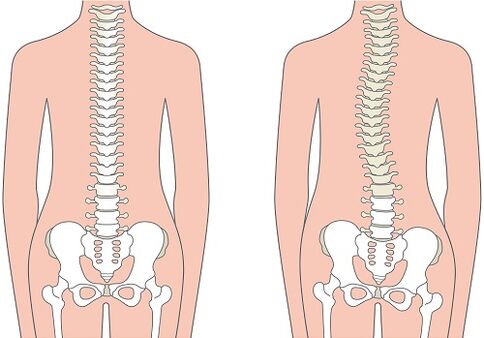
Curvature occurs throughout life. Often a person himself provokes changes in himself, not watching his posture or preferring to sleep in a soft bed. As a result, the load on the bones, muscles and ligaments is not distributed physiologically, which leads to pain.
People with established diagnoses will have to experience regular attacks:
- Kyphosis.
- Scoliosis.
- Lordosis.
- Flat back syndrome.
Strict adherence to the doctor’s recommendations can help in this case. Even if a person is born with such pathologies, it is possible today to stop development and live a full life.
Osteoporosis
Pulling, aching pain radiating into the chest may be the only sign of developed osteoporosis. At the same time, the unpleasant sensations are weak and appear irregularly. More often, discomfort is felt after heavy physical exertion or when the weather changes.
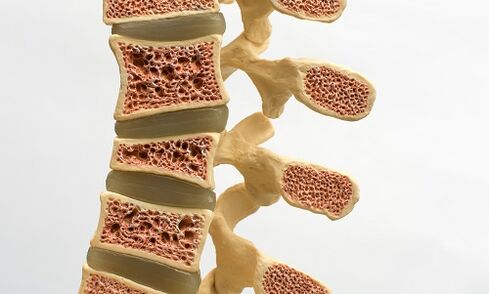
Even if the disease was not congenital, it can develop during life as a secondary disease after a number of negative influences, including intoxication and improper use of medications.
A pathological fracture is considered dangerous. It is accompanied by more severe pain than usual. At the same time, since there was no injury as such and does not interfere with movement, it often remains undiagnosed. Which after some time can lead to additional complications.
The question of how to quickly cure lower back pain is relevant for people with osteoporosis, because in their case, unpleasant attacks can be easily and quickly stopped.
Injuries
When thinking about why, when I sit or stand for a long time, my lower back in the area of the spine, often below the lower back, constantly hurts, try to remember if you hit this place.
Even a minor blow or fall can cause serious injuries that may not be easily detected at first glance.The most common causes of traumatic back pain:
- Contusion of the spinal column.You can easily get it by falling unsuccessfully or colliding with your back. It manifests itself as mild pain, sometimes the formation of swelling or bruising at the site of the impact. Most often does not require special treatment. However, in severe cases it can provoke neurological symptoms.
- Compression fracture. More often it occurs with forced sharp bending of the torso. Later it manifests itself as severe pain when moving. Sharp processes of the vertebrae can be felt locally.
- Vertebral subluxationreveals itself not only with pain and swelling, but also with frequent numbness at the site of injury. The lower limbs also gradually begin to go numb.
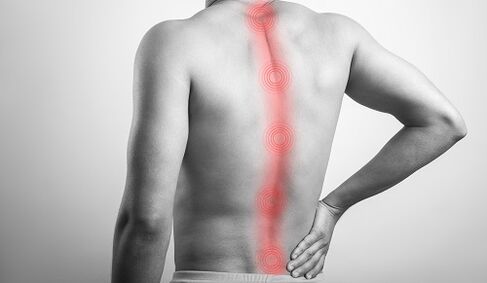
It is extremely important to be extremely careful about impacts and falls in the spine area. Due to mild pain, it is easy to miss serious damage, which will subsequently lead to greater restrictions in life.
Infections
The cause of burning chronic severe pain that constantly aches, stabs, grabs and does not go away in the lumbar and lower back area can be infections.
There are pathologies that affect the spinal column. Without treatment, these diseases will quickly turn a person into a disabled person.Spread of infection:
- Osteomyelitiscan be introduced into the body through injury, during surgery, or through contact with another infected person. The infection causes sharp, severe pain that occurs with every sudden movement. In this case, the chronic course of the infection is characterized by smoothed manifestations of pain. Additionally, the person suffers from intoxication, chills, and fever.
- Epidural abscessleads to severe pain, combined with chills and severe muscle tension.
- Tuberculosis of the spinal columndevelops slowly but inevitably. At first it manifests itself only as periodic pain after physical exertion and stiffness of gait. As the bones deteriorate, the pain increases and the ability to move fully decreases.
Local inflammation
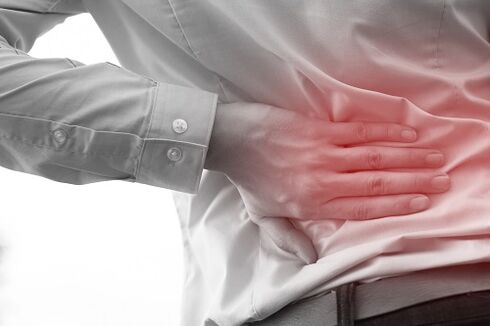
In addition to constantly spreading unpleasant sensations, sometimes people experience stabbing pain in the lower back, in the lower back, when sitting, what it could be and what it is called is determined by a specialist based on the results of examination and tests. The cause is local inflammation.
Boils, carbuncles and paranephritis are easy to recognize. The first two phenomena are lumps on the skin that react painfully to touch. In the case of paranephritis, fever appears first, and severe pain, which prevents full movement and walking, develops on days 2-3. The condition is considered serious and requires hospitalization.
Infectious diseases
Sometimes the explanation for why the lower back may ache, it constantly gets into it, grabs when you stand for a long time, and sometimes the back begins to hurt as if it will soon fall off, and the decision on what to do and what to treat for can be infectious diseases.
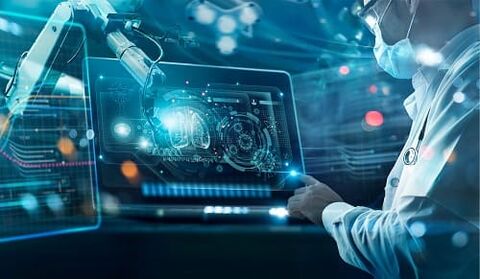
Increased temperature, intoxication, the need to look for a more comfortable position, pain in muscles and joints - these are signs of an infected person. Often occurs in severe cases of ARVI or influenza.
Similar symptoms may also indicate infection:
- Ebola fever.
- Human-type Foot and Mouth Disease.
- Severe course of coronavirus.
- Generalized forms of viral or fungal infections.
If such signs appear, you should immediately consult a doctor, as the condition can worsen in a matter of hours.
Muscle damage
When figuring out why the lower back hurts and pulls, why it grips the back in the area of the spine, why when you sneeze it radiates to the back, which began to hurt much more often, you need to establish the cause before deciding what to do.
In addition to problems directly with the spine, muscle damage can also hinder a person. This problem is often encountered by professional athletes, people who do a lot of strength training, or who do physical labor. After excessive tension for several days, painful sensations arise in the lower back muscles, which disappear under the influence of drugs, warming ointments and massage.
However, there are also chronic changes in muscle tissue, which often occur against the background of serious diseases and are their consequence. If they are detected, complex therapy is carried out, sometimes even surgical intervention is required.
Types of pain
To understand what helps with lower back pain and how to get rid of it, you need to pay attention to the characteristics of the symptom.
If the unpleasant sensations arose suddenly and recently, then the phase is called acute, and if you suffer for more than 3 months, then it is called chronic.
Depending on the intensity and variety of sensations, there are:
- Mechanical.Occurs after heavy physical activity, often in the afternoon, along with a feeling of fatigue. Easily cured by rest. Most often this is the result of degradation of the bone structures of the spine or its severe curvature.
- Inflammatory.Intensifies after rest, a period of immobility. After some time, it weakens due to constant movement or taking anti-inflammatory painkillers.
- Local.The result of direct damage to muscles, joints or ligaments. Concentrates directly at the point of damage.
- Koreshkovaya.Appears when nerves are pinched due to injury, tumors, or hernias. Simultaneously with the occurrence of pain, the sensitivity of the injury site decreases.
- Reflex.The most dangerous type because it deceives people. The patient thinks that he has lower back pain, but in fact these are reflected sensations that arise due to a disease of the internal organs.
- Myofascial.A protective mechanism, as it appears due to muscle spasm when bones are damaged.
Depending on the description of the sensations, the doctor will be able to understand in the first minutes what kind of disease the person contacting him has.
Which doctor should I contact?
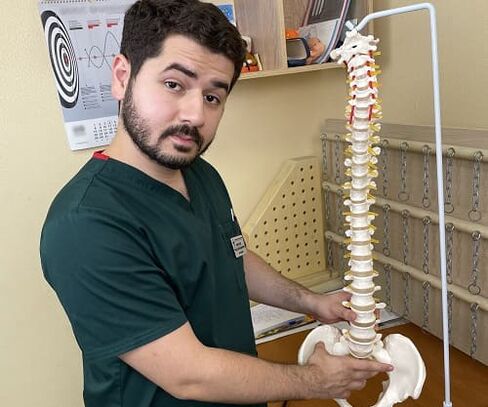
As soon as there is an unpleasant shooting in the lower back, constant pain or discomfort, the question arises of seeing a doctor.
Since this part of the body is specific due to the fact that there are not only the spine and muscles, but also a large number of internal organs, which can also cause discomfort if the disease develops, it is highly not recommended to treat yourself at home. Due to the inability to determine the source of pain, the situation can worsen.
Initially, it is better to consult a general practitioner with such symptoms. Based on the symptoms that appear, the characteristics of the pain and the location of the lesion, he will be able to determine which specialist should deal with the problem.You may be referred to:
- Neurologist.
- To the surgeon.
- Urologist or gynecologist.
- Nephrologist.
After the examination, they will prescribe the necessary tests to determine the exact cause of the discomfort.
By deciding to go to a specialist on your own without first consulting a therapist, you risk making an inaccurate diagnosis and wasting valuable time.
Diagnostics
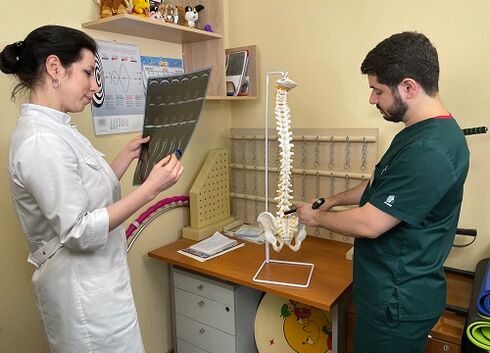
Very often, patients turn to the doctor when hellish pain appears in the back, so severe that it hurts to get up and walk, without even straightening up, why does it hurt in the center or lower back, what can bother you in the spine, what causes the condition, and what to do, whattreatment for lower back pain.
Diagnostics:
- Patient interviewcollection of data on signs and time of development of the disease. It is also important to find out your medical history and identify chronic diseases that can influence the development of attacks.
- Neurological examination.The doctor checks whether reflexes are preserved, how much muscle strength and reaction speed are affected, and how much movement is constrained. Additionally, the degree of superficial and deep sensitivity is examined.
- X-ray of the affected area of the back.The image will show the injuries received, a pathological decrease in the intervertebral space, curvature, and the onset of degenerative processes. New growths are also detected.
- CT or MRIused to clarify the obtained data. They help determine the location of even small hernias or processes on the spine, help to understand where the pinched nerves are located and why this happened.
- Functional studiesare aimed at determining the condition of the muscles and the degree of damage to the nervous tissue, the speed of passage of the nerve impulse.
- Lab tests.Blood sampling is necessary to determine whether the inflammation is infectious in nature.
Additionally, depending on the indications, an x-ray of internal organs located near the painful area may be prescribed. This is done to prevent exacerbations of chronic diseases of the kidneys, gastrointestinal tract or genitourinary system.
Treatment
It is extremely important to correctly provide first aid to the patient and transport him to a medical facility without additional injuries. In the event of an attack, place the person on something hard or lighten the load on the back, and then take him to the hospital.
How and with what to treat the back and what to do when the back in the middle of the spine is very severe and constantly hurts in the lumbar region, lower back, the doctor decides only after finding out the reasons why this happened, treatment in this case is prescribed both conservative and in the form of surgical intervention.
Before the examination, it is not recommended to use drugs to suppress symptomatic pain; only a single dose of analgesics is allowed.
After examination and diagnostic measures, the doctor will prescribe suitable treatment, which is complex for back diseases.Therapy includes:
- Taking medications.
- Physiotherapy.
- Use of external medications.
- Lifestyle changes.
In difficult cases, surgical intervention is also performed.
Several types of drugs are used to treat back pain:
- NSAIDs are painkillers and anti-inflammatory drugs.At the first visit, it is possible to administer it by injection; in the future, doctors recommend a combination of tablets and ointments with a similar effect.
- Local anestheticsused to create a blockade in cases where the pain becomes unbearable.
- B vitaminsenhance the effect of other medications, stimulate improved blood supply to the affected area of the back.
- Physiotherapycarried out after relief of acute pain. As soon as the attack ends, special therapy is selected that has a positive effect on the condition of the spine. Additionally, a set of physical therapy exercises is prescribed.
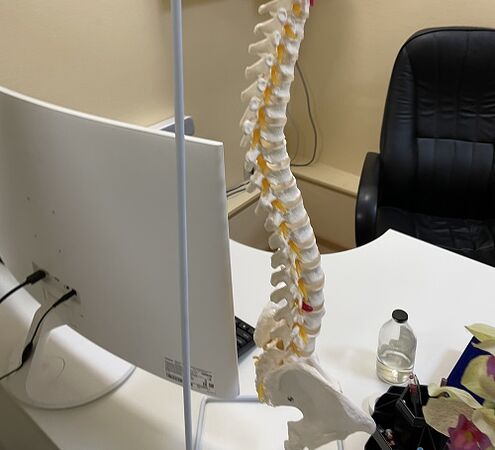
Surgical intervention is an undesirable option for developing the situation. Since the spine is one of the most complex organs of the human body. There are many points near it that affect the functioning of the body, so doctors try to carry out surgical intervention as little as possible. However, there are hopeless situations where it is impossible to restore health without a surgeon’s scalpel.
Surgical intervention is required:
- In case of tumor formation.They are removed regardless of benignity or malignancy, since a gradual increase brings serious pain and can provoke the onset of paralysis.
- Intervertebral hernias,gradually destroying the space around them. They are the culprits of constant, never-ending pain.
- Narrowing of the intervertebral canal.
- Instability of the spinal elements,severe injuries requiring additional fixation of bones in their places.
After a course of treatment or surgery, the patient must be prepared for the fact that there is still a lot to do in order to finally say goodbye to pain.
Rehabilitation
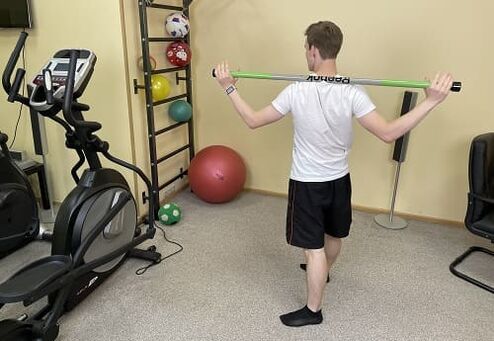
Depending on the reasons why the spine hurts in the lumbar region and the intensity of the pain, treatment is prescribed. However, taking a course of medications and possible surgery is not all that is needed to return to a full, healthy life.
More often, additional rehabilitation includes physiotherapeutic procedures.Frequent appointments:
- Massage.Moreover, it is not recommended to choose this procedure for yourself.
- Physical therapy course,which is carried out under the supervision of an experienced trainer who knows at what speed and intensity the exercises must be performed. It is also possible to use specialized simulators.
- Manual therapy.
- Acupuncture.
- Physiotherapy,aimed at the additional use of painkillers: electrophoresis, magnetic therapy, laser treatment.
When deciding how to treat severe, acute or aching back pain in the lumbar region, the doctor determines what to do if the spine constantly aches and ache, the muscles are seized and stiff, depending on the reasons, additional treatment is prescribed. In which a course of restorative procedures is additionally prescribed in detail that will help improve well-being and return to a healthy state. Patients should be prepared that the rehabilitation period may last more than one month if the nerve endings or vertebrae were severely damaged.
Consequences
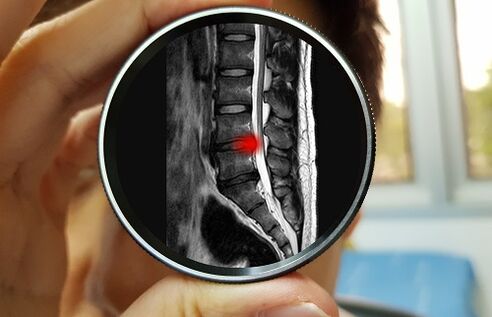
If, turning to friends with a complaint: "If the lower back suddenly hurts for no reason, the back falls off, then what to do in such a situation? "in response you only hear a suggestion to take a painkiller, do not hesitate to follow this advice.
The main consequences of untreated spinal diseases:
- Greater spread of painintensification of attacks due to the fact that more healthy tissue will suffer from a gradually expanding problem area.
- A sharp deterioration in the functioning of the cardiovascular system.And problems in this area can lead to the development of chronic diseases of any organ, including deterioration of brain function.
- In worst cases it is possibletemporary or permanent paralysis of the limbs.
Also, self-medication without preliminary diagnosis or doctor’s prescriptions can lead to a deterioration in well-being. And subsequently, the course of treatment and recovery will become long and complex.
Prevention

The main medical direction that helps to maintain health and avoid unpleasant days in which you will be deprived of the opportunity to live a full life is prevention. It will help avoid inflammation or the occurrence of many lower back diseases.
You must adhere to several rules and tips:
- Choose a medium-hard mattress for the bedroom.
- If you move little throughout the day, but sit a lot at the computer, then break for a few minutes every hour to do a short warm-up of the lumbar spine.
- Give up bad habits.
- Try not to make sudden, ill-considered body movements.
- Exercise regularly. Even a small 15-minute exercise in the morning already has a positive effect on the condition of the spine. After 30, it is best to find a hobby that will allow you to get the physical activity you need, with a low chance of injury. Consider doing yoga or swimming in the pool to stay in shape.
- Control your posture.
- Avoid severe hypothermia in the lower back.
- Treat detected diseases in a timely manner.
- Get regular preventative checkups.
- If you experience pain in your back, contact the clinic immediately for a consultation.
Painful sensations in the spine are one of the most unpleasant. In addition to direct pain, they also bring with them stiffness in movements, which prevents them from living a full, normal life.
The sooner professional treatment for back problems is started, the sooner a person can return to a full life. And neglecting your health in this case can lead to disability.




















